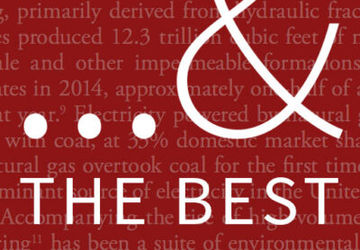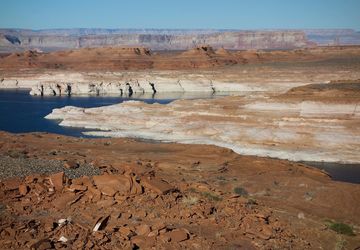The sun sets through smoke filled skies at the Happy Camp Complex Fire in the Klamath National Forest in California. Photo by the U.S. Forest Service via Flickr.
Updated: August 19, 2020
With new wildfires burning across the Bay Area, the combined threat of COVID-19 and fire poses significant risks to community safety. Earlier this summer, we convened experts to discuss the challenges of preparing for and responding to wildfires during a pandemic. Intended for a practitioner audience, the panels offer important insight into how to harness resources to protect individuals, property and the environment during these times. Recordings of these important discussions are available below.
When Bay Area counties issued the first COVID-19 shelter-in-place orders back in mid-March, the Bill Lane Center for the American West was days away from hosting an in-depth workshop on wildfire management. While we had to cancel in-person panels focused on adaptation, mitigation, disaster preparedness and more, we are pleased to announce that we revived the workshop in a virtual format.
Our new, online wildfire series explores the challenges of preparing for and responding to wildfires during the coronavirus pandemic for a practitioner audience. On June 25, we hosted the first of several panels with great success. Don Gordon of CALFire and Chief Daryl Osby of the Los Angeles County Fire Department joined us to discuss training and safety among first responders battling wildfires during a pandemic. Though Osby expressed reasonable concern about financial cuts to fire services, and how that might impact wildfire response, both panelists were optimistic about their ability to continue to serve and protect the public. "The fire service is committed to protecting safety, property and environment," said Don Gordon. "COVID might change our internal response; we'll be more vigilant about safety protocols. But we’ll bring in as many resources as needed to ensure our response to wildfire risk is the same."
On June 30, we hosted our second virtual wildfire event with Dr. Sarah McCaffrey of the U.S. Forest Service. McCaffrey focused on how homeowners can take active steps to mitigate their fire risk, and she offered recommendations for community preparedness.
Our third panel in this series was held on July 9, taking up the human dimensions of responding to wildfires in the face of COVID-19. Speakers discussed evacuations, shelters, and government coordination.
Panel, June 25 - Wildfire Management and Preparation during the COVID-19 Pandemic
Panelists
- Don Gordon, Assistant Deputy Director, Cooperative Fire, Training, and Safety, CALFire
- Daryl L. Osby, Fire Chief, Los Angeles County Fire Department
Moderator
- Rebecca Miller, PhD Candidate, E-IPER
Keynote, June 30 - What Motivates Homeowners to Mitigate Fire Risk? Lessons from Social Science
This keynote highlights aspects of U.S .Forest Service research examining wildfire risk perceptions, incentives for creation and maintenance of defensible space, and key factors to consider in preparing for wildfire given the double threats of wildfires and COVID-19.
Speaker
- Sarah McCaffrey, Research Forester, USFS
Panel, July 9: Preparedness and Recovery: The Human Dimensions of Wildfires
Panelists
- Alma Bowen, Executive Director, Nuestra Comunidad
- Charles Brooks, Executive Director, Rebuild Paradise Foundation
- Luke Beckman, Division Disaster State Relations Director, American Red Cross
Moderator
- Rebecca Miller, PhD Candidate, E-IPER
We were also pleased to collaborate with the Stanford Woods Institute for the Environment on their July 14 webinar, Wildfire Preparedness: Strategic Investments to Balance Risk. This program featured a panel of experts including Chris Field, Kelly Martin, Rebecca Miller and Michael Wara.



